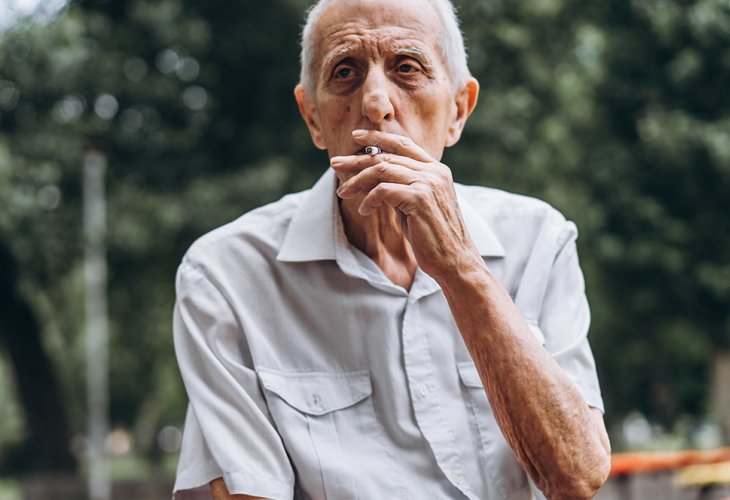Personal Stories
Reunion of the Heart: A Yom Kippur Miracle
How a heartbreaking vow turned into a holy reunion that changed two lives forever
 (Photo: shutterstock)
(Photo: shutterstock)Many years ago, during one of my trips to the United States, the man seated next to me caught my attention. He was Israeli, and I noticed his meal had a label: “Moshe Hershkowitz.” But although he had a clearly Jewish name, his food was obviously not kosher.
My curiosity got the better of me. I turned to him politely and said, “Excuse me, I don’t mean to offend, but can I ask you something?”
“Sure,” he replied.
“Did you know there’s a kosher meal option on this flight?” I asked gently.
He looked at me and said, “I don’t eat kosher,” his voice full of tension and pain.
Then he added, “Do you want to know why I don’t eat kosher?” From the way he spoke, I could tell this wasn’t a casual choice. It was a deep, painful struggle.
I nodded, and he began talking, more to himself than to me.
“It was because of my son. That’s what broke me. Somehow I survived. In the ghetto, on the train, in the concentration camp, I kept going. My wife was already gone. My other children too. Only he was left. I promised myself we would make it through.”
He paused, his eyes distant, as if lost in another time.
“One day, the Nazis called all the prisoners for roll call. But instead of letting us go afterward, they told us to turn around. Behind us, gallows. Dozens of them. People panicked and ran. In the chaos, I lost my son… and I never found him. Weeks later, someone told me he had been murdered.”
He wiped away his tears, now burning with grief and anger.
“Hashem took all my children from me! Every one of them! So I told Him if I can’t be a father, then He can’t be a Father to me. Don’t talk to me about mitzvot. I don’t want to hear!”
I sat there stunned, overwhelmed by his pain. I didn’t know what to say. I mumbled something and turned away. We didn’t speak again during the flight, and when we landed in New York, we went our separate ways.
I never imagined we’d meet again.
Four years passed. My father became seriously ill, and my brother and I took turns staying with him every day, including Shabbat and the Jewish holidays.
That Yom Kippur, it was my turn. My father was living in a senior home in Jerusalem, and I helped him get to the small synagogue inside for the day’s prayers.
Right before Yizkor, the memorial prayer, there was a short break. I stepped outside to get some fresh air and there, sitting at the bus stop across from the building, was a man smoking a cigarette.
On Yom Kippur.
I looked more closely and suddenly realized who it was. Moshe Hershkowitz.
In that moment, I felt clearly that Hashem had brought us back together for a reason. I had been given another chance to reach out. I walked slowly toward him.
“Mr. Hershkowitz, here we are again. I don’t know if you remember, but a few years ago, we sat next to each other on a plane. It’s amazing how life brings people back together.”
He looked at me but said nothing.
I gently continued, “You probably know that today is Yom Kippur. In the synagogue right here, we’re about to say Yizkor, memorial prayer. Why don’t you come in and say a prayer for your son, who died al kiddush Hashem, for the sanctification of God’s name? You can honor his memory and pray for his soul.”
His eyes filled with tears. He didn’t argue. I offered my arm, and he slowly stood. Together, we walked into the shul.
When the Yizkor prayer began, I led him to the chazzan (cantor) and asked that a special prayer be said for a young man who had died in the Holocaust. Mr. Hershkowitz leaned against the platform and took a deep breath.
“Yonatan Uziel ben Yechezkel Shraga,” he said softly, clearly.
Suddenly, a man standing nearby turned pale. Sweat broke out on his forehead. He trembled all over. Then he looked at Mr. Hershkowitz and cried out in a choked voice, “Father! Father!” and fainted on the spot.
Baruch Hashem, the story had a beautiful ending. Moshe Hershkowitz was reunited with his son and eventually returned to a life of connection with Hashem. He was blessed with happiness and nachat, true joy from his son and grandchildren.
For me, this moment taught a powerful lesson about humility and healing.
Moshe had lived for years filled with anger toward Hashem, convinced he was right. And yet, when someone gently suggested he take one small step back just to say one prayer for his son, he agreed.
Sometimes people live trapped in their pain or their beliefs, unable to consider another way. Even if they’re unhappy, even if it’s hurting them, they still say, “This is who I am.”
But real change doesn’t always need something dramatic. Sometimes all it takes is a small moment of openness. A quiet “I’m sorry.” A warm smile. A simple prayer, even if you’re still hurting.
The Torah teaches us that if we take one step toward Hashem, He will take many steps toward us.
May we all be blessed to feel His kindness, healing, and love in our lives.

